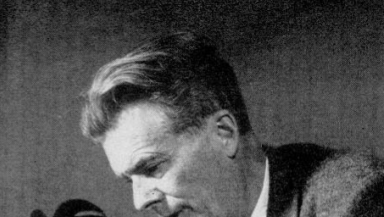
What is happening in the world? Sometimes we stand so close that we cannot see the bigger picture. In today's world of Covid, vaccine passports, police raiding churches, endemic sexual abuse, gender confusion, disillusionment with government, there can be a temptation for the Christian to either despair and retreat, or despair and end up fighting the wrong battles.
We need to constantly remind ourselves that the Lord is sovereign and can even use what men meant for ill, to bring about good (as we see for example with Joseph's brothers). He is also able to teach us through those who are not his people. I am amazed that it is secular commentators like Jordan Peterson and Doug Murray who seem to have a better grasp of the bigger picture than many Christian ones.
Looking back, I see CS Lewis, Francis Schaeffer and today, Os Guinness, as Christian prophets who saw where we were going and accurately predicted the state we have now found ourselves in. But there is another secular 'prophet' who in my view was astonishingly prescient and that is Aldous Huxley, the author of amongst other books, Brave New World.
This book, written in 1932, foresaw a 'soft totalitarianism' of absolute government where conformity was enforced, as Margaret Attwood summarises it, by bio-engineering, hypnotic persuasion, endless consumption, state encouraged sexual promiscuity, drugs and a caste 'class' system where everyone fulfils their pre-ordained function.
Recently I came across Huxley's 1946 introductory essay to his book. It is a revealing and astounding addition because much of what he shares in it we can see happening today – 85 years later.
Here are some quotes and lessons I hope we can learn for the church.
Huxley explains that his novel is about the advancement of science as it affects others. He recognises that: "This really revolutionary revolution is to be achieved, not in the external world, but in the souls and flesh of human beings."
The Church at its best has always recognised that.
He then explains how "a really efficient totalitarian state would be one in which the all-powerful executive of political bosses and their army of managers control the population of slaves who do not have to be coerced, because they love their servitude."
That sounds eerily familiar! How will we love our servitude? Not just by the kind of propaganda Orwell wrote of in 1984 but by silence: "The greatest triumphs of propaganda have been accomplished, not by doing something, but by refraining from doing. Great is the truth, but still greater, from a practical point of view is silence about truth."
Sometimes it is not so much what we discuss but what we do not or are not permitted to discuss. The greatest problem facing the Christian church today is not that our message is rejected but that it is not heard.
"The most important Manhattan projects of the future will be vast government sponsored inquiries into what the politicians and the participating scientists will call 'the problem of happiness' - in other words, the problem of people making people love their servitude."
One of the problems in Christian evangelism is that we too often assume that people are basically unhappy and are just longing for a way out. But in much of modern society, people are bound in sin, but are happy to be that way. They know nothing different and need to be shaken out of that soporific complacency. The state wants to make us content and silent so that we will not question. The Church should make people question and challenge, so that we will recognise the illness and accept the remedy.
He talks about how governments will need to offer economic security and use drugs, as well as create a pre-conditioned status for its citizens. They will also need to use eugenics as a means of standardising the human product. The Church needs to resist this attempt by the state to recreate humanity in its own image.
Huxley was also prescient about where sexual morality was heading (remember that this was written before the pill and the sexual revolution of the 1960s), and he foresaw the diminishing of marriage.
"Nor does the sexual promiscuity of Brave New World seem so very distant. There are already certain American cities in which the number of divorces is equal to the number of marriages. In a few years, no doubt, marriage licences will be sold like dog licences, good for a period of 12 months, with no law against changing dogs or keeping more than one animal at a time."
This following paragraph chillingly summarises the route that Western society is on today: "As political and economic freedom diminishes, sexual freedom tends compensatingly to increase. And the dictator [unless he needs cannon fodder and families with which to colonise empty or conquered territories] will do well to encourage that freedom. In conjunction with the freedom to daydream under the influence of dope, and movies and the radio, it will help to reconcile his subjects to the servitude which is their fate."
Again, note that he wrote of all of this before the development of the Internet and the resultant brain dumbing effects of YouTube, Twitter, Tik Tok etc.
In 1932 Huxley thought that this brave new world would take 600 years to come into existence, but by the time he wrote this essay in 1946 he thought it would happen within a single century. He saw the choice as being between "national militarised totalitarianisms ... or else one supranational totalitarianism, called into existence by the social chaos resulting from rapid technological progress in general and the atom revolution in particular, and developing, under the need for efficiency and stability, into the welfare tyranny of utopia."
Huxley in this essay offers a third alternative between the insanity of the Brave New World, or the insanity of the Savage world. He suggests that sanity is possible. For him it was a kind of hyper religious Taoism – all reaching for the highest good. He thought that the use of mescaline and lysergic drugs would help us to connect with the spiritual and have 'open minds'. He advocated this in a book, The Doors of Perception (1954), that would become a bible for the hippies and the psychedelic Sixties. The Doors named their band after the book and the Beatles placed him on their famous Sergeant Pepper cover.
Huxley was right in his analysis of the problem and wrong in his solution. The 1960s' sexual and drug revolution occurred, and not only has it not stopped the insanity, it has accelerated it.
In the Gospel we have a far greater remedy. Because we are looking forward to a new world, we are able to serve and care for the old one. Because we believe in the law of God, we are able to challenge the law of man. Because we are renewed in our minds, we are able to think, challenge and be radical.
The real revolutionaries are not those who bow to the all-encompassing will of the elites, but those who, in following Jesus Christ, know that the poor and marginalised really do matter – and are not just there to be used as soundbites. Instead of people loving their servitude, let us teach people to love their Saviour. Then we will see a renewed world.
David Robertson is director of Third Space in Sydney and blogs at www.theweeflea.com













